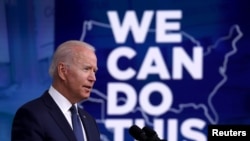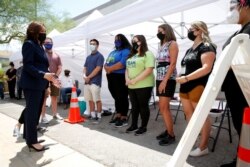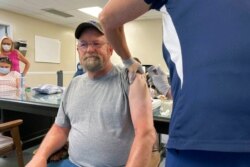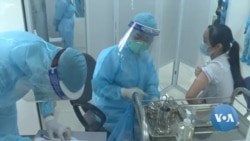As 10 U.S. states see a spike in coronavirus cases, President Joe Biden warned on Tuesday that "millions of Americans are still unvaccinated and unprotected and, because of that, their communities are at risk."
In his latest broadcast appeal for people to get vaccinated against COVID-19, the president said the delta variant of the virus, which is more transmissible and potentially more dangerous, is already responsible for half of the cases in many parts of the country.
The states of Kansas and Missouri, in particular, are reporting double-digit percentage surges in infections due to the delta variant.
To respond to further outbreaks anticipated among the unvaccinated, Biden said the federal government is mobilizing COVID-19 surge response teams, staffed with experts from the Federal Emergency Management Agency, the U.S. Centers for Disease Control and Prevention and other agencies.
Those teams will help states with "particular problems [to] prevent, detect and respond to the spread of the delta variant among unvaccinated people in communities with low vaccination rates," Biden said in a speech from the White House South Auditorium.
"We can't get complacent now," the president warned.
Vaccine skeptics
Shortly before Biden spoke, the leader of the opposition Republicans in the U.S. Senate, Mitch McConnell, said in Kentucky, where only about 43% of residents are fully inoculated, "there's no good reason not to get vaccinated."
Targeting his remarks at vaccine skeptics, McConnell said while the vaccines do not guarantee one will not get infected from COVID-19 "it almost guarantees you don't die from it if you get it."
Vaccine hesitancy, especially among Republicans, is blamed for the Biden administration falling short of its goal to have 70% of American adults at least partially inoculated against COVID-19 by July 4.
Only 45% of Republican have received their first dose, according to a Washington Post-ABC News poll. The same poll showed 86% of Democrats and 54% of independents had received at least one vaccine shot. Some minority groups are also lagging in getting vaccinated.
The president on Tuesday said that within a few days there will be "160 million fully vaccinated Americans, up from roughly 3 million when we took office five months ago."
According to the CDC, about 67% of Americans had received one dose of a COVID-19 vaccine and 47% had received two doses just prior to the Independence Day holiday.
There is a stark regional contrast in vaccination rates. In the Northeast, more than half of adults are fully vaccinated.
By contrast, Southern states are performing poorly. In Alabama, Arkansas, Louisiana and Mississippi, 35% or less of adults have received full doses, according to the Centers for Disease Control and Prevention.
If not in all parts of the United States, there is a desperate demand for those doses in other countries.
Donating vaccines
Biden's administration on Tuesday announced shipments of Moderna vaccine doses to Guatemala and Vietnam after it fell short of its target of donating 80 million doses to the rest of the world by the end of June.
All the doses have been allocated, but there have been logistical challenges, White House press secretary Jen Psaki said when asked on Tuesday about the shortfall.
"Sometimes we have to work through legal barriers, we have to work through regulatory barriers. There are issues as it relates to materials needed to distribute these vaccines. And there are also even transportation issues with refrigeration needed as well," Psaki said during the daily White House briefing prior to the president's remarks.
"Countries need to be ready to receive them on the ground. And there is no past precedent for this. So, there are certainly lessons that we have learned," she said.
At a time when vaccine supplies are still limited, there is a need to "figure out what we have excess supply of and how quickly we can export those doses. And in many cases, they may be mRNA vaccines like Pfizer or Moderna, as opposed to the Johnson & Johnson, or even AstraZeneca, that we have some supply of in the U.S. even though it's not authorized here yet," said Dr. Krishna Udayakumar, director of the Global Health Innovation Center at Duke University. "There's a huge amount of country-level planning and country ownership that's required for this to be successful."
The 80 million doses pledged by the United States out of the 1 billion promised by the Group of Seven nations will be inadequate for global demand.
Only about 1% of the population in Africa has received any doses, according to the World Health Organization.
"We have locked up in the United States and the G-7 and other EU countries the global supply of the very thing to end this pandemic," said Tom Hart, acting chief executive officer of the ONE campaign, a group fighting extreme poverty and preventable disease.
"We need 11 billion doses to reach global herd immunity," Hart added.
Patsy Widakuswara at the White House contributed to this report.














